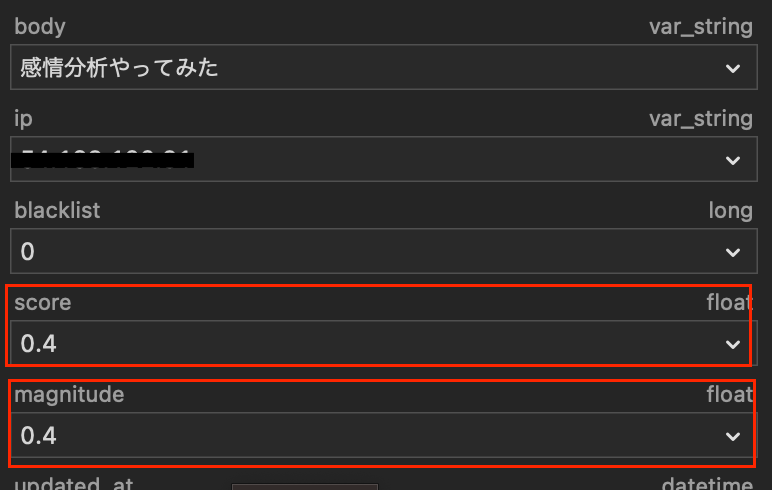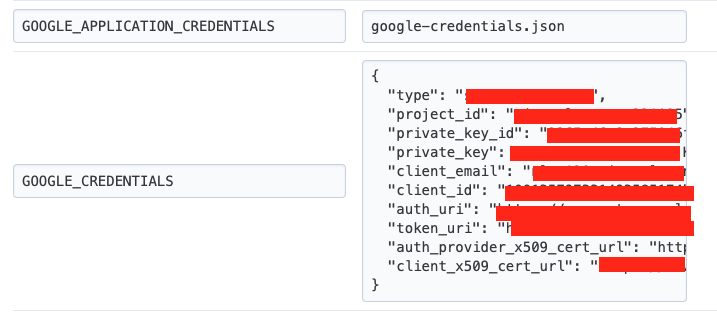#前書き
RailsアプリでGCPのAPIを叩きたかったけれど、全然情報が出てこなかったのでまとめておく
あと以下の記事を参考にしても再現できなくて少し困った
https://ebi-works.com/gpc-app/
https://qiita.com/fuj1kky/items/4912ca7e821a5aafebdc
#実現したこと
###Docker + Rails + GCP + heroku
自作したWEBアプリの口コミ(コメント)を投稿したときに

bodyの内容に対してGCPで用意されている自然言語処理の感情分析のAPIを叩き
scoreとmagnitudeを取得しDBに保存

#開発環境
Docker version 20.10.5, build 55c4c88
ruby 2.6.8
Rails 6.1.4.1
#①処理の流れ
該当プロジェクトのAPIを有効にしAPIキー(json)を取得していることを前提とする
gem 'google-cloud-language'
module GoogleCloudPlatformAccessAuthentication
extend ActiveSupport::Concern
class Authorization
def self.init
Google::Cloud::Language.language_service version: :v1
end
end
end
class Comment < ApplicationRecord
include GoogleCloudPlatformAccessAuthentication
belongs_to :account
before_save :save_sentiment_analysis
# bodyの内容をもとにGCPで用意されているNLPapiで感情分析を行いその値をDBに格納するメソッド
# HACK: fatモデルの原因になりそう
def save_sentiment_analysis
client = Authorization.init
body = read_attribute(:body)
document = { content: body, type: :PLAIN_TEXT }
response = client.analyze_sentiment document: document
sentiment = response.document_sentiment
score = sentiment.score.to_f.round(1)
magnitude = sentiment.magnitude.to_f.round(1)
write_attribute(:score, score)
write_attribute(:magnitude, magnitude)
end
end
#app/db/Schemafile
create_table "comments", id: :bigint, unsigned: true, force: :cascade, options: "ENGINE=InnoDB DEFAULT CHARSET=utf8mb4", comment: "アカウント情報に紐づくコメント(POSTデータ)" do |t|
t.integer "account_id", null: false
t.string "body", limit: 191, default: "", null: false
t.string "ip", comment: "リモートipアドレス"
t.integer "blacklist", default: 0, comment: "ブラックリストに入っているipアドレスかどうか判別するフラグ"
t.float "score", comment: "コメント全体がネガティブ傾向かポジティブ傾向か"
t.float "magnitude", comment: "コメントに感情的なワードがどれくらい含まれているか"
t.datetime "updated_at", precision: 6, null: false
t.datetime "created_at", precision: 6, null: false
end
#envファイル
#dotenv-railsを入れた
GOOGLE_APPLICATION_CREDENTIALS = config/gcpのページからダウンロードしたjsonファイル.json
これで一応Dockerのローカル環境では動く
#②herokuでの環境変数の扱い方について
ここで一つ疑問。
「あれ、環境変数がjsonファイルの時herokuでどうすんだ?」
以下を参考にした(全然日本語の情報出てこなかった)
ためになった記事①
ためになった記事②
要約すると
①まずbuildpackをセットする必要があるわけだが、これではなく
こちらを使うこと
$ heroku buildpacks:add https://github.com/gerywahyunugraha/heroku-google-application-credentials-buildpack
②buildpackが実行される順番も気をつけること。
heroku/rubyよりも先に実行することが重要

Note that the --index 1 and the order here are important. Heroku docs re: multiple buildpacks: "The buildpack for the primary language of your app should be the last buildpack added."(一部抜粋)
